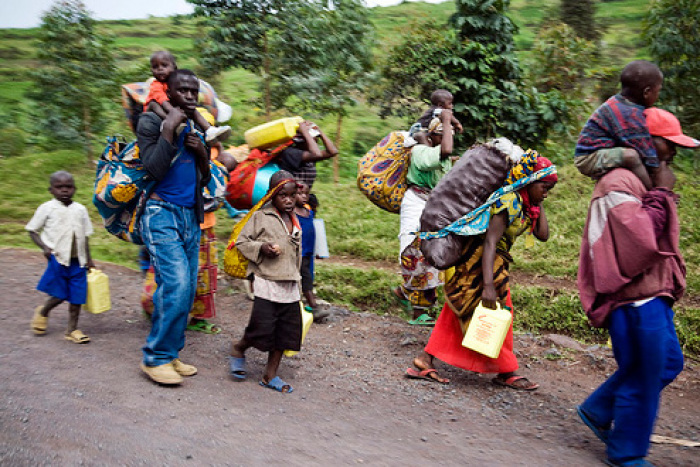2 injured in church bombing before confirmation ceremony in DRC; 2nd bomber killed by own IED

At least two people were injured after a makeshift bomb exploded inside a Catholic church in the conflict-plagued eastern city of Beni in the Democratic Republic of Congo on Sunday. Hours later, a suspected bomber was killed by his own improvised explosive device at a busy intersection.
The bomb exploded in the church premises at 6 a.m. on Sunday, according to authorities. A police official told Agence France-Presse that the homemade bomb was "set up for an ambush." The attack reportedly marked the first time a Catholic church had been attacked in the region.
Beni Vicar General Laurent Sondirya told the outlet that the explosion went off before people gathered for a confirmation ceremony and two women were injured.
“They were targeting a large crowd because the ceremony would bring together children, their parents and the faithful,” Sondirya was quoted as saying.
Blood was seen at the entrance to the church and shards of glass were inside the church after the explosion.
Media reports have not identified the parish where the bomb exploded.
In the second explosion in Beni on Sunday, a suspected bomber was killed at a busy intersection. Photos were shared online showing the blood-soaked torso of the suspected bomber, Reuters reported.
Beni Mayor Col. Narcisse Kashale Muteba put a curfew in place over security concerns.
“I’m asking the population to take shelter and remain indoors," Muteba was quoted as saying on Congo’s RTR private radio. "I don’t want to see anyone outside. There was no damage, only the transporter of the bomb died on the spot.”
While no group claimed responsibility for either of the attacks, militants from the Allied Democratic Forces, a group based in neighboring Uganda that has publicly aligned itself with Islamic State, has been active in the country.
Even though DRC’s population is around 95% Christian, violence from Islamic extremism is worsening, especially in the eastern region.
Islamic extremist groups have “a clear Islamic expansionist agenda,” Illia Djadi, an Open Doors spokesperson on freedom of religion or belief in sub-Saharan Africa, said earlier this year.
“It is a reminder of what is happening in other parts of the central Sahel region — groups like Boko Haram in northeast Nigeria, for example," Djadi said. "The ideology, the agenda of establishing a ‘caliphate’ in the region, and the way they operate is the same, and we can see how they afflict terrible suffering on innocent people."
Between Nov. 20 and Dec. 3, 2020, men from the Allied Democratic Forces killed at least 30 Christians, raped 10 young women and girls, and abducted several others from churches in a string of attacks on five villages in North Kivu province, according to the Barnabas Fund.
Last October, militants believed to be from the Allied Democratic Forces killed at least 18 people and burned down a church and several homes in an overnight attack in Baeti Village in the North Kivu province, Reuters reported at the time.
The Allied Democratic Forces were formed in the mid-1990s, merging several existing rebel groups.
In a 2020 report, the United Nations acknowledged that “widespread, systematic and extremely brutal” human rights abuses by the Islamic militant group “could constitute, by their nature and scope, crimes against humanity and war crimes.”
DRC is ranked No. 40 on the Open Doors USA's 2021 World Watch List of countries where Christians face the greatest persecution.



























